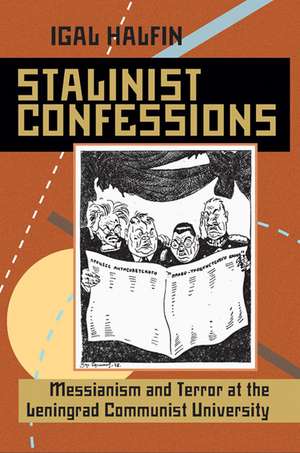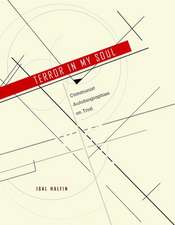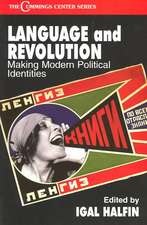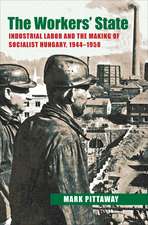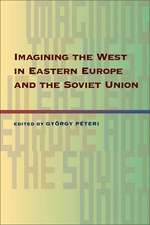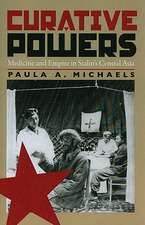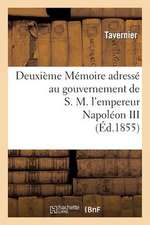Stalinist Confessions: Messianism and Terror at the Leningrad Communist University: Russian and East European Studies
Autor Igal Halfinen Limba Engleză Paperback – 30 aug 2009
During Stalin's Great Terror, accusations of treason struck fear in the hearts of Soviet citizens-and lengthy imprisonment or firing squads often followed. Many of the accused sealed their fates by agreeing to confessions after torture or interrogation by the NKVD. Some, however, gave up without a fight.
In Stalinist Confessions, Igal Halfin investigates the phenomenon of a mass surrender to the will of the state. He deciphers the skillfully rendered discourse through which Stalin defined his cult of personality and consolidated his power by building a grassroots base of support and instilling a collective psyche in every citizen. By rooting out evil (opposition) wherever it hid, good communists could realize purity, morality, and their place in the greatest society in history. Confessing to trumped-up charges, comrades made willing sacrifices to their belief in socialism and the necessity of finding and making examples of its enemies.
Halfin focuses his study on Leningrad Communist University as a microcosm of Soviet society. Here, eager students proved their loyalty to the new socialism by uncovering opposition within the University. Through their meetings and self-reports, students sought to become Stalin's New Man.
Using his exhaustive research in Soviet archives including NKVD records, party materials, student and instructor journals, letters, and newspapers, Halfin examines the transformation in the language of Stalinist socialism. From an initial attitude that dismissed dissent as an error in judgment and redeemable through contrition to a doctrine where members of the opposition became innately wicked and their reform impossible, Stalin's socialism now defined loyalty in strictly black and white terms. Collusion or allegiance (real or contrived, now or in the past) with “enemies of the people” (Trotsky, Zinoviev, Bukharin, Germans, capitalists) was unforgivable. The party now took to the task of purging itself with ever-increasing zeal.
In Stalinist Confessions, Igal Halfin investigates the phenomenon of a mass surrender to the will of the state. He deciphers the skillfully rendered discourse through which Stalin defined his cult of personality and consolidated his power by building a grassroots base of support and instilling a collective psyche in every citizen. By rooting out evil (opposition) wherever it hid, good communists could realize purity, morality, and their place in the greatest society in history. Confessing to trumped-up charges, comrades made willing sacrifices to their belief in socialism and the necessity of finding and making examples of its enemies.
Halfin focuses his study on Leningrad Communist University as a microcosm of Soviet society. Here, eager students proved their loyalty to the new socialism by uncovering opposition within the University. Through their meetings and self-reports, students sought to become Stalin's New Man.
Using his exhaustive research in Soviet archives including NKVD records, party materials, student and instructor journals, letters, and newspapers, Halfin examines the transformation in the language of Stalinist socialism. From an initial attitude that dismissed dissent as an error in judgment and redeemable through contrition to a doctrine where members of the opposition became innately wicked and their reform impossible, Stalin's socialism now defined loyalty in strictly black and white terms. Collusion or allegiance (real or contrived, now or in the past) with “enemies of the people” (Trotsky, Zinoviev, Bukharin, Germans, capitalists) was unforgivable. The party now took to the task of purging itself with ever-increasing zeal.
Din seria Russian and East European Studies
-
 Preț: 422.97 lei
Preț: 422.97 lei -
 Preț: 332.65 lei
Preț: 332.65 lei -
 Preț: 141.48 lei
Preț: 141.48 lei -
 Preț: 428.75 lei
Preț: 428.75 lei - 15%
 Preț: 678.74 lei
Preț: 678.74 lei -
 Preț: 433.53 lei
Preț: 433.53 lei -
 Preț: 238.43 lei
Preț: 238.43 lei -
 Preț: 388.79 lei
Preț: 388.79 lei -
 Preț: 436.25 lei
Preț: 436.25 lei -
 Preț: 295.91 lei
Preț: 295.91 lei -
 Preț: 326.41 lei
Preț: 326.41 lei -
 Preț: 127.24 lei
Preț: 127.24 lei -
 Preț: 123.55 lei
Preț: 123.55 lei -
 Preț: 315.41 lei
Preț: 315.41 lei -
 Preț: 171.58 lei
Preț: 171.58 lei -
 Preț: 485.99 lei
Preț: 485.99 lei - 15%
 Preț: 493.66 lei
Preț: 493.66 lei -
 Preț: 474.45 lei
Preț: 474.45 lei -
 Preț: 391.67 lei
Preț: 391.67 lei -
 Preț: 502.16 lei
Preț: 502.16 lei -
 Preț: 431.62 lei
Preț: 431.62 lei -
 Preț: 113.42 lei
Preț: 113.42 lei -
 Preț: 422.00 lei
Preț: 422.00 lei -
 Preț: 395.54 lei
Preț: 395.54 lei -
 Preț: 179.30 lei
Preț: 179.30 lei -
 Preț: 397.45 lei
Preț: 397.45 lei -
 Preț: 470.60 lei
Preț: 470.60 lei -
 Preț: 363.26 lei
Preț: 363.26 lei -
 Preț: 461.94 lei
Preț: 461.94 lei -
 Preț: 352.86 lei
Preț: 352.86 lei -
 Preț: 272.52 lei
Preț: 272.52 lei -
 Preț: 349.81 lei
Preț: 349.81 lei -
 Preț: 184.58 lei
Preț: 184.58 lei -
 Preț: 317.63 lei
Preț: 317.63 lei -
 Preț: 468.65 lei
Preț: 468.65 lei -
 Preț: 432.57 lei
Preț: 432.57 lei -
 Preț: 182.40 lei
Preț: 182.40 lei -
 Preț: 389.76 lei
Preț: 389.76 lei -
 Preț: 426.63 lei
Preț: 426.63 lei -
 Preț: 465.76 lei
Preț: 465.76 lei -
 Preț: 126.00 lei
Preț: 126.00 lei -
 Preț: 283.50 lei
Preț: 283.50 lei -
 Preț: 403.43 lei
Preț: 403.43 lei - 23%
 Preț: 568.69 lei
Preț: 568.69 lei - 23%
 Preț: 565.89 lei
Preț: 565.89 lei - 23%
 Preț: 556.25 lei
Preț: 556.25 lei -
 Preț: 385.91 lei
Preț: 385.91 lei -
 Preț: 422.97 lei
Preț: 422.97 lei -
 Preț: 385.53 lei
Preț: 385.53 lei -
 Preț: 423.35 lei
Preț: 423.35 lei
Preț: 498.97 lei
Nou
Puncte Express: 748
Preț estimativ în valută:
95.48€ • 99.69$ • 79.02£
95.48€ • 99.69$ • 79.02£
Carte tipărită la comandă
Livrare economică 04-18 aprilie
Preluare comenzi: 021 569.72.76
Specificații
ISBN-13: 9780822960164
ISBN-10: 0822960168
Pagini: 560
Ilustrații: 67 illustrations
Dimensiuni: 156 x 235 x 30 mm
Greutate: 0.68 kg
Ediția:1st Edition
Editura: University of Pittsburgh Press
Colecția University of Pittsburgh Press
Seria Russian and East European Studies
ISBN-10: 0822960168
Pagini: 560
Ilustrații: 67 illustrations
Dimensiuni: 156 x 235 x 30 mm
Greutate: 0.68 kg
Ediția:1st Edition
Editura: University of Pittsburgh Press
Colecția University of Pittsburgh Press
Seria Russian and East European Studies
Recenzii
“Halfin's work focuses on one institution, the Communist University in Leningrad, through the maelstrom of the Great Purges. Through one discrete social and political setting, Halfin provides a “thick description” of the Great Terror, from student party cells to party leaders' dachas to the execution rooms in the basements of NKVD buildings. At its core, this book examines the procedures of the purge and what it meant to its participants on both sides of the interrogation table. This is a seminal study and a major contribution to understanding one of the most disputed and puzzling events in modern history.”
—Peter Holquist, University of Pennsylvania
—Peter Holquist, University of Pennsylvania
“In this study of the Great Purges, [Halfin’s] examination of Stalinist language and ideolog do much to deepen our understanding of this extemely disturbing and perplexing event.”
—Slavic Review
—Slavic Review
“Culminating Halfin's pathbreaking work on the political culture of Soviet Communism, this book offers a fundamentally new reading of the Stalinist purges. Halfin takes seriously the eschatological orientation informing the Communist project. Drawing on secret NKVD interrogation files, he presents the purges as a moral reckoning and final judgment. Halfin's achievement is immense: he effectively unravels what used to be called the mystery of the Stalinist purges.”
—Jochen Hellbeck, Rutgers University
—Jochen Hellbeck, Rutgers University
“An important contribution to the scholarly understanding of perhaps the least explained phenomenon in Russia’s modern history, the upsurge of mass political violence during the late 1930s, widely known as the Great Terror. . . . In particular, the book is a step forward in eludicating the intellectual and linguistic dimensions of the terror—a complex and challenging field, in which Halfin has done significant work.”
—The Russian Review
—The Russian Review
“A terrific book at an empirical level, and one that offers some fascinating insights into the behavior of people during the purges.”
—The Journal of Modern History
—The Journal of Modern History
Notă biografică
Igal Halfin is senior lecturer in the department of history at Tel Aviv University. He is the author of Intimate Enemies: Demonizing the Bolshevik Opposition, 1918-1928; From Darkness to Light: Class, Consciousness, and Salvation in Revolutionary Russia; and Terror in My Soul: Communist Autobiographies on Trial. Halfin is also editor of Language and Revolution: The Making of Modern Political Identities.
Descriere
A study of the Great Purge in the setting of Leningrad Communist University, seen in the rhetoric of the accused and their accusors.
